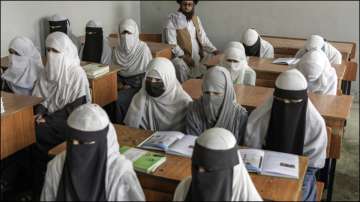A member of the Taliban government said that Afghan girls of all ages are now permitted to study in religious schools, which were traditionally for boys only. This came a day after UN special envoy Roza Otunbayeva told the Security Council that they were receiving "more and more anecdotal evidence" that girls could study in Islamic schools, also called madrassas.
Mansor Ahmad, a spokesperson for Afghanistan's Education Ministry, told the Associated Press that there were no age restrictions for girls at government-controlled madrassas, only that girls must be in a madrassa class appropriate to their age.
"If her age is not in line with the class and (the age) is too high, then she is not allowed. Madrassas have the same principles as schools and older women are not allowed in junior classes," said Ahmad, adding that privately-run madrassas have no age restrictions and females of all ages, including adult women, can study in these schools.
Afghanistan only country to restrict female education
However, Otunbayeva said that it was not clear to the UN what constituted a madrassa, if there was a standardised curriculum that allowed modern education subjects, and how many girls were able to study in the schools. There are around 20,000 madrassas in Afghanistan, of which 13,500 are government-controlled. There is no comment as of now from higher education officials on the restrictions on women.
The Taliban have been globally condemned for banning girls and women from education beyond sixth grade, including university. One of the few options for girls to receive any kind of education after sixth grade are the madrassas.
Afghanistan's higher education minister, Nida Mohammed Nadim, said last December that the university ban was necessary to prevent the mixing of genders and because he believed some subjects being taught violated the principles of Islam.
Taliban employs a different interpretation of the centuries-old Sharia law, which includes public executions, amputations and flogging. Women's access to public parks has already been restricted and they now require a male guardian for long-distance travel. The harsh measures on women have triggered international outrage and concerns over human rights violations, especially in Muslim-majority countries.
India calls for an inclusive government structure
India on Wednesday called for the formation of an inclusive government structure in Afghanistan, stressing the need to combat terrorism and preserve the rights of women, children and minorities, expressing concern at the current humanitarian situation of the country.
Notably, India has still not recognised the Taliban government and has repeatedly said that Afghan soil must not be used for any terrorist activities against any country. However, India's development partnership with Afghanistan includes more than 500 projects spread across each of the 34 provinces of the war-torn country in critical areas of power, water supply, road connectivity, healthcare, education, agriculture and capacity building.
“Our common and immediate priorities include providing humanitarian assistance for the Afghan people, formation of an inclusive and representative government structure, combating terrorism and drug trafficking, and preserving the rights of women, children, and minorities,” said India's Permanent Representative to the UN Ruchira Kamboj.
(with inputs from agencies)
ALSO READ | India expresses concern over situation in Afghanistan, calls for inclusive government structure
Latest World News
